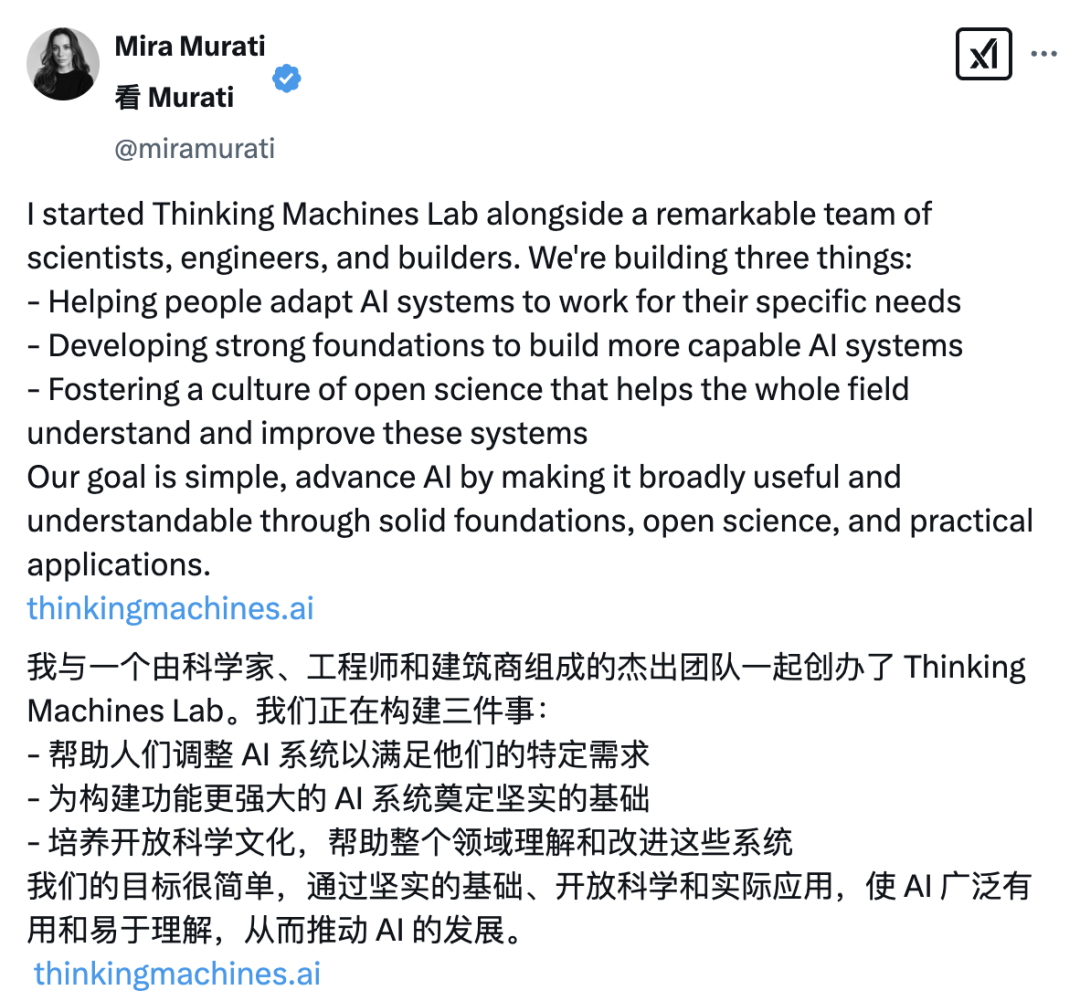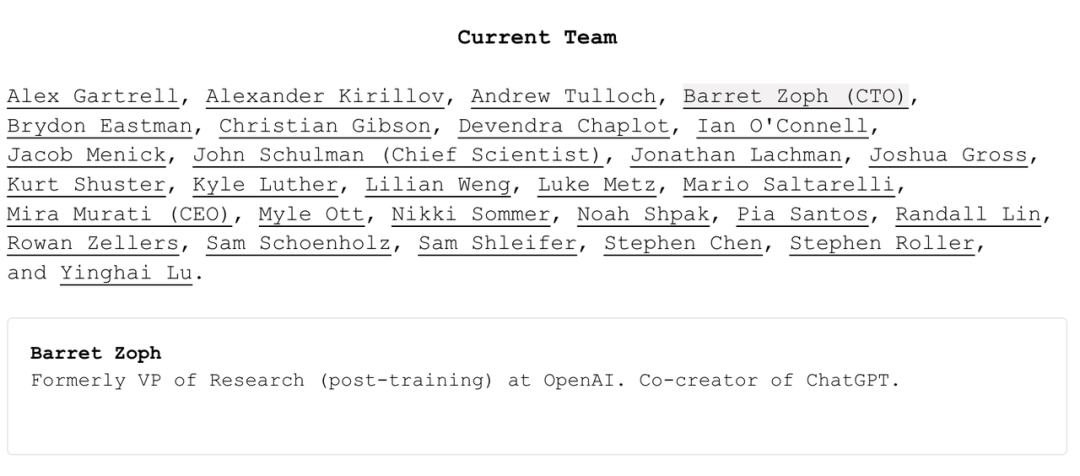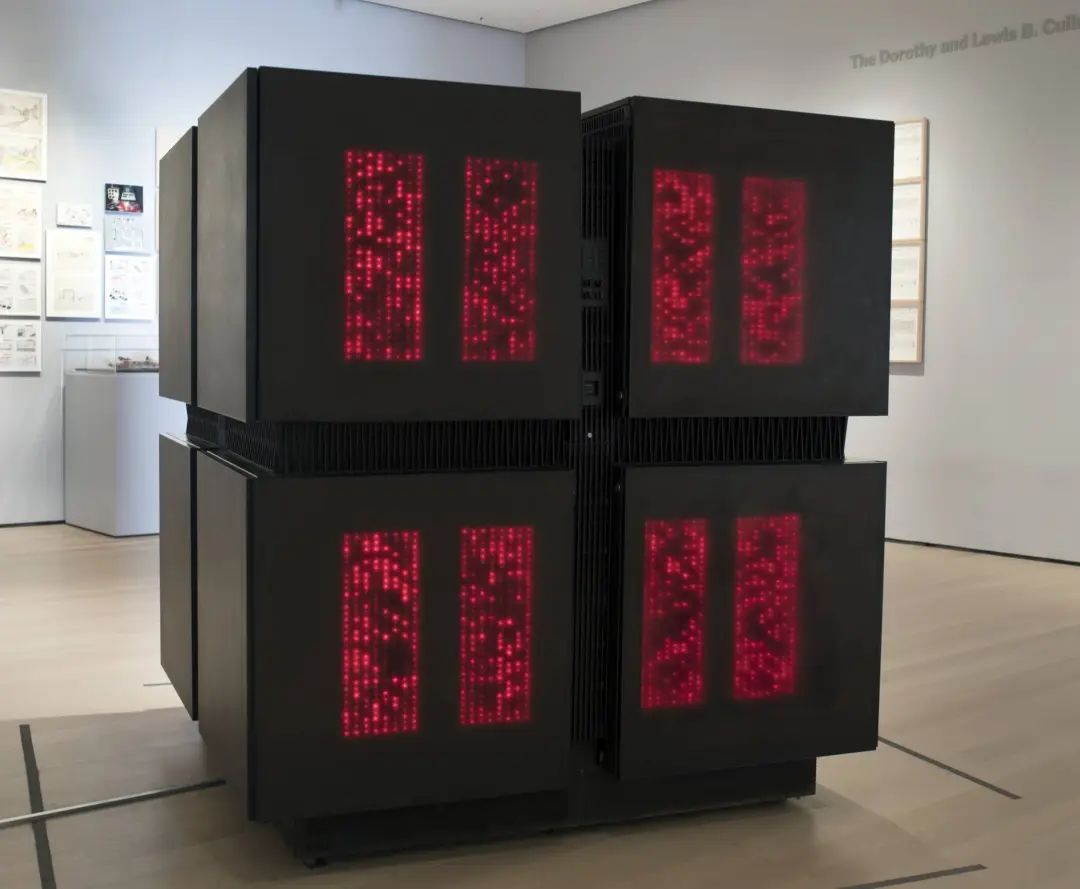Article source: APPSO
 Image source: Generated by AI
Image source: Generated by AI
The boots landed, and Mira Murati startup, former CTO of OpenAI, officially announced.
The lineup of the new company, Thinking Machines Lab, is quite luxurious, and most of them come from the old team of OpenAI, including but not limited to Barret Zoph (CTO), John Schulman (Chief Scientist), etc., which had been previously announced.
Our old acquaintance Lilian Weng (Weng Li) also appeared in the official propaganda lineup. She graduated from Peking University with an undergraduate degree and joined OpenAI as a research scientist in 2017. She has participated in pre-training of GPT-4, intensive learning and alignment, model safety, etc. work.

Investment is not just about investing in products, but also about investing in people.
Earlier, it was reported that although it had not released any products, Mira’s new company still relied on its “face-brushing” and initially expected to raise more than US$100 million.

Early this morning, Mira also issued an article on the X platform explaining the original intention of the new company:
Together with an outstanding team of scientists, engineers and builders, I founded the Thinking Machines Lab. We are doing three things: helping people adapt artificial intelligence systems to their specific needs, building a strong foundation to develop more powerful artificial intelligence systems, cultivating a culture of open science, and helping the entire field understand and improve these systems.
Our goal is simple: to promote the development of artificial intelligence by making artificial intelligence widely used and easier to understand through a solid foundation, open science and practical applications.
For this team composed of 29 well-known AI people, the official website’s introduction is as follows:
We are scientists, engineers, and builders who have created some of the most widely used artificial intelligence products, including ChatGPT and Characterist.ai, open source weighting models such as Mistral, and popular open source projects like PyTorch, OpenAI Gym, Fairseq, and Segment Anything.

So will Thinking Machines Lab be another OpenAI company?
According to the official announcement blog, Thinking Machines Lab is an AI research and product company with the goal of building a future where everyone can gain knowledge and tools to apply AI to their unique needs and goals.
Although major breakthroughs have been made in AI technology, the scientific community’s understanding of its cutting-edge systems is still limited, and relevant knowledge is mainly in the hands of top research laboratories, which has affected the public’s understanding and use of AI.
At the same time, existing AI systems still have shortcomings in personalized customization.
In order to solve these problems, this group of scientists and engineers who have participated in the development of well-known AI products such as ChatGPT and Characterist.ai, and open source projects such as PyTorch have established the Thinking Machines Lab to improve the intelligibility, customization and versatility of AI.
Thinking Machines Lab believes that scientific development requires open sharing and plans to collaborate with the research community by publishing technical blogs, papers and code. These concepts together point to one goal:Create AI systems that are more practical, smarter, and closer to human needs.

When talking about operating concepts and security strategies, the blog mentioned that product deployment can promote technology iteration while helping teams focus on solving the most impactful problems.
Thinking Machines Lab will contribute to AI security in the following ways:
1. Maintain high standards of security-preventing abuse of published models while maximizing user freedom, 2. Share best practices and methods for building secure AI systems with industry, and 3. Accelerate external research on alignment issues by sharing code, datasets, and model specifications. It is believed that methods developed for existing systems, such as effective red team testing and post-deployment monitoring, will provide valuable insights into more powerful systems in the future.
In addition, the name of Mira’s new company (Thinking Machines Lab) also has great origins.
According to foreign media Wired magazine, more than 30 years ago, American inventor Danny Hillis had long dreamed of collaborative cooperation between humans and machines.

As a student of AI pioneer Marvin Minsky, Hillis built a supercomputer with powerful parallel running chips, which is arguably the precursor to running AI computing clusters today. Hillis founded his new company, Thinking Machines, based on this computer.
However, this computer was ahead of its times and eventually declared bankrupt in 1994.
Now, this historic name is reborn in a new form, and Mira will take over this historical banner and create the next Thinking Machines.



